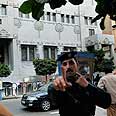
Egypt's censorship office gave permission on Wednesday for the screening of a historical documentary about the country's Jewish community, the director said, following a delay caused by a security agency that expressed reservations about the title.
"Jews of Egypt" will screen on March 27, director Amir Ramses said on Wednesday after the censor's office told him it had decided to license the film.
He said the censor had attributed the hold-up to concerns on the part of security officials, highlighting the influence that security agencies still wield after the 2011 revolution that swept former President Hosni Mubarak from power.
The film depicts changes in Egyptian society's acceptance of its Jewish minority in the first half of the 20th century.
Most Jews fled the country due to attacks on their community, particularly after the 1956 war, when Israel invaded Egypt along with Britain and France, which were trying to regain control of the Suez Canal.
The film was initially approved last year by the censor's office, but its license had expired in October, Ramses said.
When reviewing the most recent request for a license, Abdel Sattar Fathy, the head of the censorship office, said he had come across a security note stating that the film was not for "public screening due to it being a documentary."
In a March 12 interview with Al-Ahram online, Fathy said he then followed up with the security apparatus.
"They told me that the name of the film could cause great doubt in the general situation in the country," he said.
Justifying their concerns, the security officials cited controversy last year over comments by a top member of the Muslim Brotherhood's political party who called for Jews of Egyptian descent to return to Egypt from Israel.
In addition, they cited "the current complicated conditions in the street."
Speaking to Reuters by telephone, Ramses said cited public criticism as one reason for the decision to allow the film.
"It is both surprising and unsurprising, given the pressure they faced," he said. The film will be screened at two cinemas in Cairo and a third in Alexandria.















